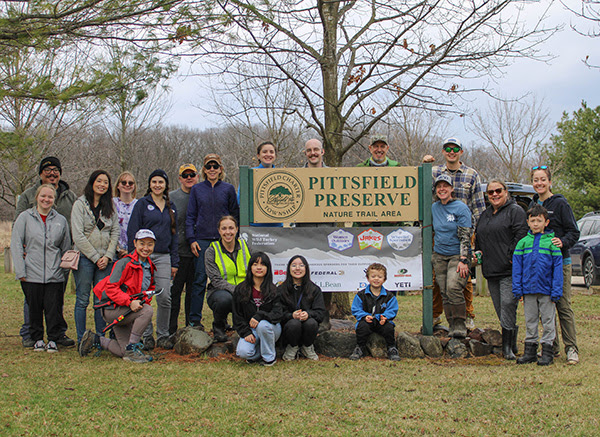EDGEFIELD, S.C. — The NWTF Washtenaw County Conservationists Chapter of Michigan, in collaboration with Pittsfield Parks and Recreation Department, hosted a conservation field day at Pittsfield Preserve Nature Trail Area to remove invasive ornamental pear trees from the area.
Jen Davis, NWTF hunting and shooting R3 coordinator along with Ashleigh Donahey, Pittsfield recreation specialist, welcomed everyone to the event and explained what the objectives were for the day.
“Bradford pear was planted broadly in many developed areas as an ornamental under the mistaken assumption that they were sterile and not able to escape cultivation,” said Davis. “Unfortunately, we’ve learned that they can reproduce quite readily, and they don’t provide benefits to the wildlife.”
The problem with invasive species like Bradford pear is it outcompetes and overcrowds native tree species that ecosystems depend on.
“The Pittsfield Preserve represents a vital link in the chain of rapidly disappearing wildlife corridors through this area of southeast Michigan,” said Davis. “Pittsfield Township sits in the confluence of three watersheds and has historically been both wetlands and agricultural lands. The rapid development of the area makes restoring high quality habitat in areas like the preserve crucial. The work we are doing was not about restoring a historic baseline, but rather to provide a diversity of resources to the wildlife, including wild turkey.”
Davis explained that by removing invasive pear allows for the native grasses and wildflowers to grow, providing a favorable ecosystem for the beloved wild turkey.
“The open grassy area in the middle of the Pittsfield Preserve provides a great deal of resources, including cover, seeds for food and pollinator habitat, another food source for birds.”
When the group of volunteers arrived at the site, Davis pointed out a handful of Bradford pear saplings were spray painted bright pink to help with identification for removal. The volunteers were given tools like loopers, gardening gloves and hand saws to remove the saplings. Two volunteers equipped with chainsaws were put to the task of removing larger trees.

“The volunteer crew utilized the cut trees to build brush piles, or “rabbit-tat” to further impact the diversity of habitat offered in this site,” said Davis.
Davis also used an herbicide dyed blue on the stumps of removed plants to ensure the plants don’t grow back in the future.
After a few hours of plant removal, the chapter catered lunch for the volunteers. Everyone was able to learn about the NWTF and its mission, sign up for archery classes and plan to attend future events.

“Our first volunteer invasive species removal event was a major success in both the turnout of volunteers and the amount of Bradford pear trees that were removed,” said Donahey. “Both our staff and community are grateful for the work that was put in and can’t wait to keep chipping away at creating a better habitat for our native species to thrive in.”
About the National Wild Turkey Federation
Since 1973, the National Wild Turkey Federation has invested over half a billion dollars into wildlife conservation and has positively impacted over 24 million acres of critical wildlife habitat. The NWTF has also invested over $10 million into wild turkey research to guide the management of the wild turkey population and to ensure sustainable populations into perpetuity. The organization continues to deliver its mission by working across boundaries on a landscape scale through its Four Shared Values: clean and abundant water, healthy forests and wildlife habitat, resilient communities, and robust recreational opportunities. With the help of its dedicated members, partners and staff, the NWTF continues its work to provide Healthy Habitats. and Healthy Harvests. for future generations.
Read the full article here




